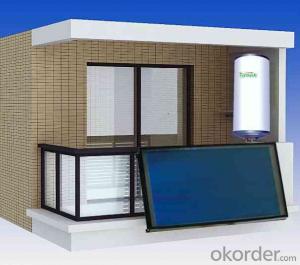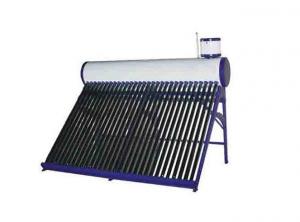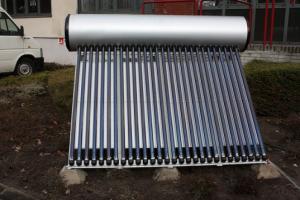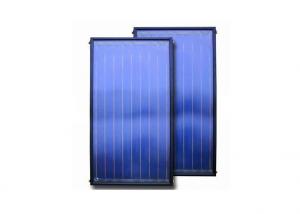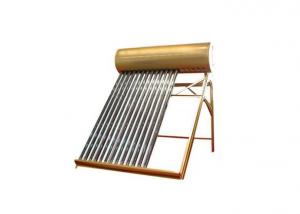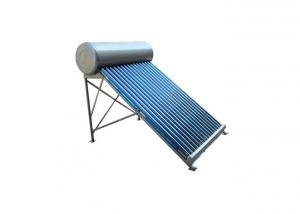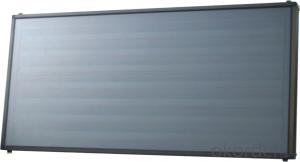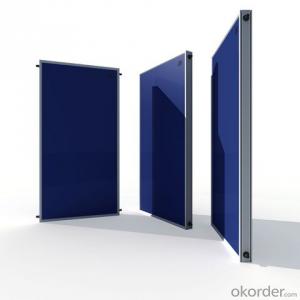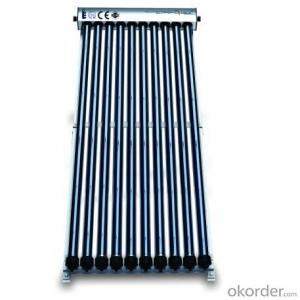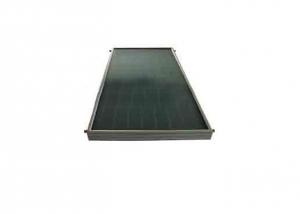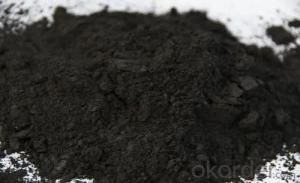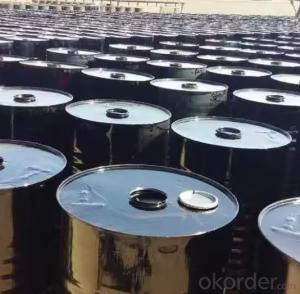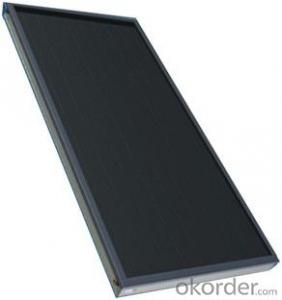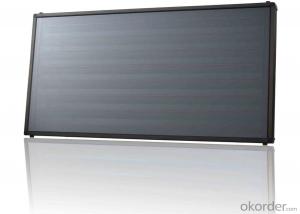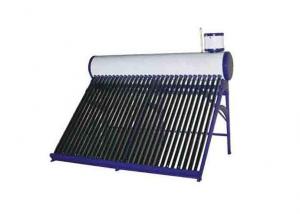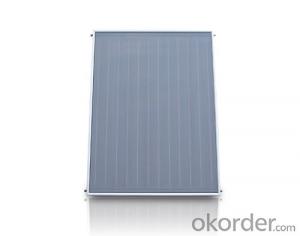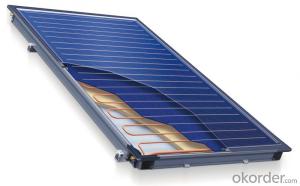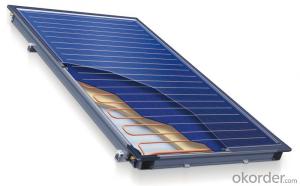Heat Pipe Vacuum Tubes Solar thermal collector with most reasonable price
- Loading Port:
- Shanghai
- Payment Terms:
- TT OR LC
- Min Order Qty:
- 500 pc
- Supply Capability:
- 10000 pc/month
OKorder Service Pledge
OKorder Financial Service
You Might Also Like
Heat Pipe Vacuum Tubes Solar thermal collector with most reasonable price China manufacturer : The heat pipe series of solar collectors are always connected with existing heating supply device. The selective coating on the inner glass of the evacuated tube converts solar energy into heat energy and transfers heat to the heat pipes by aluminium fins. The liquid in the heat pipe changes into vapour and rises to the condensation end .The heat passes through the heat exchanger into the inner wall of the vacuum tube and then transfers through the copper pipes into the liquid..The transference of heat into the liquid creaters a continuous circulation as long as the collector is heated by the sun.
FEATURE:
1. Workable at water pressure up to 0.6Mpa.
2.Possible to be connected with existing energy source.
3. Water tank may not be installed together the collector.
4.The pipeline is made of copper and conducted by heat transfer medium liquid. The vacuum tube does not take water.The coating is high strength stainless steel with air flow design ,which is furnished in good style.
5.Possible to withstand high pressure in working condition.
6.Module design, free combination to meet the demand of large water consumption.
Feature:
1,header pipe materia
2,manifold material:aluminum alloy
3,tube dimensions:l1500/47mm or 1800/58
4,vacuum tube coating material:AL-N/AL or AL/N-SS-Cu
5,insulation layer:compressed rock wool
6,test pressure:9bar
7,working pressure:6bar
8,collector mounting:flat roof/inclined roof
9,angle of operation:5 degree-90degrees
10,heat preservation:72 hours
11,hail resistance:25mm
12,copper heat pipes for rapid heat transfer
Primary competitive advantages:
1 ISO,CE,SOLARKEYMARK
2 reasonable price and good quality
3 prompt delivery
4 environmental protection
5 OEM order is available
6 experience of export to 70 countries
7 international quality warranty:10 years for solar cillector and 15 years for vacuum tube
8 runner :copper runner 35mm, 40mm, 42mm
- Q:Can solar collectors be used for heating wastewater treatment plants?
- Yes, solar collectors can be used for heating wastewater treatment plants. Solar thermal systems can provide an efficient and sustainable way to heat water for various industrial processes, including wastewater treatment. By harnessing the sun's energy, solar collectors can heat water to the desired temperature, reducing the reliance on fossil fuels and lowering carbon emissions. This not only helps in reducing operating costs but also promotes environmentally friendly practices in wastewater treatment.
- Q:How do solar collectors impact the value of a property?
- Solar collectors can significantly increase the value of a property by reducing energy costs, providing a sustainable energy source, and contributing to a greener and more efficient home.
- Q:Can solar collectors be used for heating chemical plants?
- Yes, solar collectors can be used for heating chemical plants. Solar thermal technology can provide heat for various industrial processes, including chemical plants. By capturing and converting solar energy into heat, solar collectors can reduce reliance on traditional fossil fuel-based heating systems, leading to cost savings and environmental benefits for chemical plants.
- Q:Can solar collectors be used in food processing plants?
- Solar collectors, or solar thermal systems, have the capability to be employed within food processing plants. These systems have the ability to collect sunlight and convert it into thermal energy, which can then be utilized to heat water, air, or other fluids for various industrial processes, including food processing. Within food processing plants, solar collectors can be effectively utilized to generate hot water for equipment cleaning, equipment sanitization, pasteurization, and sterilization purposes. Solar thermal systems can achieve the high temperatures required for these processes, thus reducing the dependence on traditional fossil fuel-based heating methods. Furthermore, solar collectors can be seamlessly integrated with food drying systems. Solar drying, a sustainable and cost-effective method of preserving food by reducing moisture content, can be achieved by utilizing the sun's energy to generate heat for the drying operations. This not only reduces energy costs but also minimizes the environmental impact. Nevertheless, it is important to consider various factors, such as sunlight availability, installation space, and specific energy requirements of the plant, when determining the feasibility of implementing solar collectors in food processing plants. However, with advancements in solar technology and the increasing emphasis on sustainability, solar collectors are becoming an appealing option for food processing plants seeking to decrease their carbon footprint and energy consumption.
- Q:Can solar collectors be used for heating parking garages?
- Yes, solar collectors can be used for heating parking garages. Solar thermal collectors can capture the sun's energy and convert it into heat, which can then be used to provide heating for various spaces, including parking garages. This renewable energy source can help reduce the reliance on traditional heating methods and lower carbon emissions.
- Q:Can solar collectors be used in areas with limited access to electricity grids?
- Yes, solar collectors can be effectively used in areas with limited access to electricity grids. Solar collectors, such as photovoltaic panels, can harness the energy from sunlight and convert it into electricity. These systems are independent of electricity grids and can provide sustainable power to remote or off-grid locations. Additionally, advancements in energy storage technologies, such as batteries, allow surplus energy generated during the day to be stored for use during nighttime or cloudy days. Therefore, solar collectors offer a viable solution for providing electricity in areas with limited access to traditional grids.
- Q:Can solar collectors be used in wave energy converters?
- Solar collectors cannot be utilized directly in wave energy converters. The purpose of solar collectors is to seize sunlight and transform it into thermal or electrical energy. Conversely, wave energy converters are exclusively engineered to exploit the kinetic energy of ocean waves. The mechanisms and technologies employed in these two energy conversion systems differ significantly, rendering them incompatible with one another. Solar collectors are better suited for solar power generation, whereas wave energy converters are specifically designed for wave power generation, capitalizing on the uninterrupted motion of the ocean to generate electricity.
- Q:Can solar collectors be used for cooking?
- Yes, solar collectors can be used for cooking. Solar cookers are specifically designed to harness the energy from the sun and convert it into heat for cooking food. They are an environmentally friendly alternative to traditional cooking methods and are particularly useful in areas with abundant sunlight and limited access to other sources of energy.
- Q:Are solar collectors suitable for industrial parks?
- Yes, solar collectors are suitable for industrial parks. They can provide a cost-effective and renewable source of energy for various industrial processes, reducing reliance on traditional power sources and lowering carbon emissions. Additionally, solar collectors can help industrial parks achieve energy independence and contribute to a more sustainable and environmentally friendly operation.
- Q:What is the maintenance cost for solar collectors?
- The maintenance cost for solar collectors varies depending on various factors, such as the type of collector, its age, location, and environmental conditions. Generally, the maintenance cost includes routine inspections, cleaning, and occasional repairs or replacements of components. However, on average, the maintenance cost for solar collectors is relatively low compared to other energy systems, as they have few moving parts and require minimal upkeep.
1. Manufacturer Overview |
|
|---|---|
| Location | |
| Year Established | |
| Annual Output Value | |
| Main Markets | |
| Company Certifications | |
2. Manufacturer Certificates |
|
|---|---|
| a) Certification Name | |
| Range | |
| Reference | |
| Validity Period | |
3. Manufacturer Capability |
|
|---|---|
| a)Trade Capacity | |
| Nearest Port | |
| Export Percentage | |
| No.of Employees in Trade Department | |
| Language Spoken: | |
| b)Factory Information | |
| Factory Size: | |
| No. of Production Lines | |
| Contract Manufacturing | |
| Product Price Range | |
Send your message to us
Heat Pipe Vacuum Tubes Solar thermal collector with most reasonable price
- Loading Port:
- Shanghai
- Payment Terms:
- TT OR LC
- Min Order Qty:
- 500 pc
- Supply Capability:
- 10000 pc/month
OKorder Service Pledge
OKorder Financial Service
Similar products
New products
Hot products
Hot Searches
Related keywords
